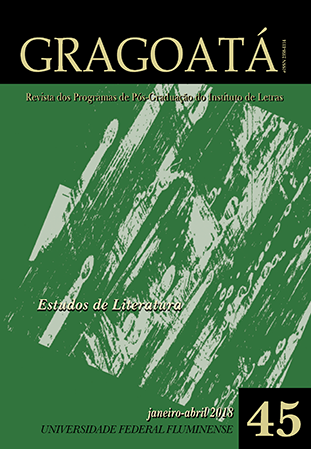Almeida Garrett rereads Victor Hugo’s 'Notre Dame de Paris': 'O Arco de Sant’Ana' and the experience of masses
DOI:
https://doi.org/10.22409/gragoata.v23i45.33572Keywords:
Almeida Garrett, Victor Hugo, historical novel, experience of masses.Abstract
With the success of his novel Notre Dame de Paris (1831), Victor Hugo was responsible for the popularization of another type of historical narrative, different from the model created by Walter Scott. Among other characteristics, Notre Dame de Paris differs from the Scottish writer's work because it can be associated with the reactionary vogue of romanticism, which, according to Lukács, defended the nostalgia of the past and an averse look at the revolutions. Defined by Maria Helena Santana (2007) as a “heterodox historical novel”, Almeida Garrett’s O Arco de Sant’Ana (1845-1851) has many points of contact with Hugo’s work, recognized by the Portuguese writer himself. One of these points that strikes us is the representation of the experience of masses, apparently similar in the two novels, but profoundly different, which would show the distance in the political perspectives of the two authors. It is our objective, in this sense, to analyze the thematic and stylistic recovery that Garrett promotes from Hugo’s novel, in order to understand its specificities in the Portuguese context.
---
Downloads
Downloads
Published
How to Cite
Issue
Section
License
Authors who publish in Gragoatá agree to the following terms:
The authors retain the rights and give the journal the right to the first publication, simultaneously subject to a Creative Commons license CC-BY-NC 4.0, which allows sharing by third parties with due mention to the author and the first publication by Gragoatá.
Authors may enter into additional and separate contractual arrangements for the non-exclusive distribution of the published version of the work (for example, posting it in an institutional repository or publishing it in a book), with recognition of its initial publication in Gragoatá.

Gragoatá is licensed under a Creative Commons - Attribution-NonCommercial 4.0 International.











